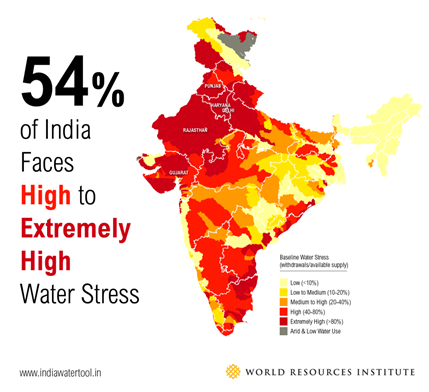


- India is fast moving towards pro-people, Participatory, visible and responsive economic prosperity while aiming to safeguard its long-term interests of ecological security by protecting the country’s diverse and unique natural heritage. Further, India is not only committed to fulfill its international obligations towards biodiversity conservation, environmental management, climate change mitigation, human rights, social justice, equity as well as peace but at the same time it is fully geared for planned accomplishment essential for the nation building and meaningful contribution towards global agenda on sustainable development.
Water Crisis –A Major Impediment
- India has just 2.4% geographical area of the world while harboring nearly one sixth of the global population and the world’s highest owner of livestock (512 million heads).
- India harbors only 4% of world’s freshwater resources. Less than 1% of the freshwater is easily accessible in lakes and rivers.
- Agriculture sector alone consumes nearly 70% of the freshwater used by humans.
Factors Responsible for water Crisis in India
- Enhanced runoff due to deforestation and loss of green cover
- Urban grey’ environment
- Changing life styles and enhanced consumption patterns
- Expansion of irrigated agriculture and resultant exploitation of depleting ground water
- Creation of physical barriers leading to storage of water in large reservoirs/ barrages and diversion of water by canals
- Wastage of water by leakage and neglect
- Inadequate facilities for recycling and rainwater storage and more importantly,
- Pollution of water by sewage and dumping of urban wastes and unchecked flow of industrial effluents.
Impact of water Scarcity in India’s economic Development
- India faces several limitations as far as water and food security is concerned. Signs of water scarcity by way of limited access, declining quantity and deteriorating quality are evident.
- The country is expected to become ‘water stressed’ as per capita surface water availability is on the decline.
- Several metropolis and rural areas face acute shortage of even drinking water. Several parts of the country are prone to water- borne diseases and human health is a major concern in such pockets.
- It is increasingly becoming a cause of drudgery as fetching water from long distances excessively affects women and takes away their considerable time from work, family care.
Water Conservation Efforts:
- Nature acts as a regulator, a cleaner and/or a supplier of water. Maintaining healthy forests and other natural ecosystems (grasslands and wetlands) directly leads to improved water security for all. Apart from forests, grasslands, wetlands and agriculture lands also play significant roles in water cycling and hence they must be given emphasis while planning for water conservation.
- Soils are critical in controlling the movement, storage and transformation of water. Biodiversity has a functional role as it underpins ecosystem processes and functions and, therefore, the delivery of ecosystem services.
Water Conservation As a National Movement
- Water Conservation primarily involves the following three objectives: Enhance water availability Improve water quality and Reducing water-related risks.
- The Government has realized the merit of adopting a comprehensive approach towards water conservation. As a result, the unified Central ‘Ministry of Jal Shakti’ has been made responsible for laying down policy guidelines and coordination of programmers for the development.
- The ministry launched ‘Jal Shakti Abhiyan’, a campaign for water conservation and water security. The campaign will run through citizen participation while focus of the campaign would be on water-stressed districts and blocks in the country.
- India has made huge investments towards implementation of ‘integrated watershed development programme’. Some of the other prominent programmes/schemes launched by concerned Ministries are: o PMKSY- ‘Har Khet ko pani’ and ‘More Crop Per Drop’; jal Shakti Abhiyan; River Basin Management; National Water Mission; National Mission for Clean Ganga-Namami Gange, National Mission for Sustainable Agriculture, National mission for Sustainable Himalayas; Dam Improvement and Rehabilitation Programme; Interlinking of Rivers, Ground Water Management, Flood Control and Forecast, Biodiversity Conservation, Wetland Conservation, Green India Mission, CAMPA and National and State Level Action Plans on Climate Change.
- Government during the period 2014-19 has implemented the ambitious progress of “Namami Gange” aiming for Ganga rejuvenation (Aviral and Nirmal Dhara) by way of forestry interventions, establishment and maintenance of STPs, conservation of aquatic life, etc.
- Several States have also initiated their own flagship programmes related to water management. Some prominent ones are: ‘Mukhya Mantri Jal Swavlamban Abhiyan (MJSA)’ by Rajasthan Government and ‘Green Mahanadi Mission’ of Odisha Government focusing on water development in water starved desert region and rejuvenation of Mahanadi River, respectively.
- Participatory irrigation management backed by the ‘Pani Panchayat Act, 2002’ in Odisha is flourishing through efficient and equitable supply and distribution of water ensuring optimum utilization by farmers.
Further Steps to be taken
- Following six priority actions are visualized for making water management sustainable in the country as a reality through an aggressive national movement.
- Institutions and Governance processes need to be strengthened. Also augmentation of manpower and financial resources is required. Participatory Approach to establish a mechanism to implement and enforce judicious use of water and efficient management of precious water resources.
- Knowledge Management for collaborations/networking and institutionalizing synergies between various entities for development and exchange of evidence-based knowledge on ecosystem functions and development of suitable technologies to improve water resource management to ensure source sustainability.
- Development of ‘Nature-Based Solutions for various aspects of water management offer batter opportunities and would be of immense help.
- Ecosystem-Based Management Approach which aims to move from isolationist approaches to holistic approaches are desirable on a priority basis.
- Thereby, greater focus on river basins and rivers capes for planning, assessment and interventions ate the need of the hour.
- This aspect seeks concerted efforts towards conservation of existing water sources as well as rejuvenation of rivers/restoration/recharging of depleted water resources.
- Success towards countering water wastage and degradation of natural ecosystems could be accomplished by creating awareness and appropriate capacity development of various stakeholders.
Related Articles


